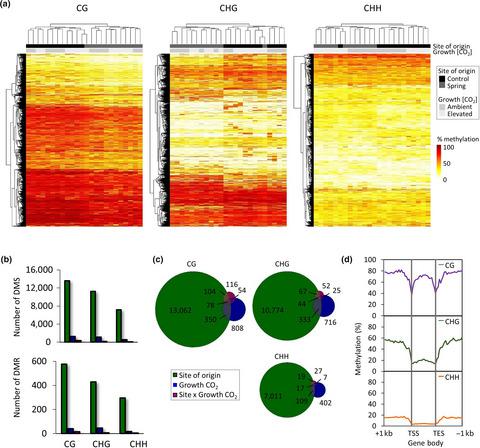当前位置:
X-MOL 学术
›
Glob. Change Biol.
›
论文详情
Our official English website, www.x-mol.net, welcomes your
feedback! (Note: you will need to create a separate account there.)
The methylome is altered for plants in a high CO2 world: Insights into the response of a wild plant population to multigenerational exposure to elevated atmospheric [CO2 ].
Global Change Biology ( IF 10.8 ) Pub Date : 2020-09-09 , DOI: 10.1111/gcb.15249 Jasmine M Saban 1 , Alexander Watson-Lazowski 1 , Mark A Chapman 1 , Gail Taylor 1, 2
Global Change Biology ( IF 10.8 ) Pub Date : 2020-09-09 , DOI: 10.1111/gcb.15249 Jasmine M Saban 1 , Alexander Watson-Lazowski 1 , Mark A Chapman 1 , Gail Taylor 1, 2
Affiliation

|
Unravelling plant responses to rising atmospheric CO2 concentration ([CO2]) has largely focussed on plastic functional attributes to single generation [CO2] exposure. Quantifying the consequences of long‐term, decadal multigenerational exposure to elevated [CO2] and the genetic changes that may underpin evolutionary mechanisms with [CO2] as a driver remain largely unexplored. Here, we investigated both plastic and evolutionary plant responses to elevated [CO2] by applying multi‐omic technologies using populations of Plantago lanceolata L., grown in naturally high [CO2] for many generations in a CO2 spring. Seed from populations at the CO2 spring and an adjacent control site (ambient [CO2]) were grown in a common environment for one generation, and then offspring were grown in ambient or elevated [CO2] growth chambers. Low overall genetic differentiation between the CO2 spring and control site populations was found, with evidence of weak selection in exons. We identified evolutionary divergence in the DNA methylation profiles of populations derived from the spring relative to the control population, providing the first evidence that plant methylomes may respond to elevated [CO2] over multiple generations. In contrast, growth at elevated [CO2] for a single generation induced limited methylome remodelling (an order of magnitude fewer differential methylation events than observed between populations), although some of this appeared to be stably transgenerationally inherited. In all, 59 regions of the genome were identified where transcripts exhibiting differential expression (associated with single generation or long‐term natural exposure to elevated [CO2]) co‐located with sites of differential methylation or with single nucleotide polymorphisms exhibiting significant inter‐population divergence. This included genes in pathways known to respond to elevated [CO2], such as nitrogen use efficiency and stomatal patterning. This study provides the first indication that DNA methylation may contribute to plant adaptation to future atmospheric [CO2] and identifies several areas of the genome that are targets for future study.
中文翻译:

高二氧化碳世界中植物的甲基化组发生了变化:洞察野生植物种群对多代暴露于升高的大气[CO2]中的反应。
揭示植物对大气CO 2浓度升高([CO 2 ])的反应主要集中在单代[CO 2 ]暴露的塑料功能属性上。长期,十年来多代人暴露于升高的[CO 2 ]的后果以及可能以[CO 2 ]为驱动因素的进化机制作为基础的遗传变化的量化方法在很大程度上尚待探索。这里,我们调查塑料和进化植物对升高[CO 2通过应用使用的人群多组学技术]长叶车前L.,在自然生长的高[CO 2 ]一种用于在CO许多世代2弹簧。来自CO 2春季和相邻控制点(环境[CO 2 ])的种群的种子在共同的环境中生长一代,然后在环境或升高的[CO 2 ]生长室中生长后代。发现CO 2春季和对照位点种群之间的总体遗传分化较低,外显子选择弱的证据。我们确定了春季相对于对照种群的种群DNA甲基化谱中的进化差异,提供了植物甲基化可能在多代中对升高的[CO 2 ]作出响应的第一个证据。相反,在[CO 2)诱导的单代甲基化重组有限(差异甲基化事件比种群间观察到的甲基化事件少一个数量级),尽管其中一些似乎稳定地跨代遗传。总共鉴定出了59个基因组区域,这些区域的转录本表现出差异表达(与单代或长期自然暴露于升高的[CO 2 ]相关)与差异甲基化位点或单核苷酸多态性位居显着之间。人口分歧。这包括已知对升高的[CO 2],例如氮的利用效率和气孔图案。这项研究首次表明DNA甲基化可能有助于植物适应未来的大气[CO 2 ],并确定了基因组的几个区域,这些区域是未来研究的目标。
更新日期:2020-10-19
中文翻译:

高二氧化碳世界中植物的甲基化组发生了变化:洞察野生植物种群对多代暴露于升高的大气[CO2]中的反应。
揭示植物对大气CO 2浓度升高([CO 2 ])的反应主要集中在单代[CO 2 ]暴露的塑料功能属性上。长期,十年来多代人暴露于升高的[CO 2 ]的后果以及可能以[CO 2 ]为驱动因素的进化机制作为基础的遗传变化的量化方法在很大程度上尚待探索。这里,我们调查塑料和进化植物对升高[CO 2通过应用使用的人群多组学技术]长叶车前L.,在自然生长的高[CO 2 ]一种用于在CO许多世代2弹簧。来自CO 2春季和相邻控制点(环境[CO 2 ])的种群的种子在共同的环境中生长一代,然后在环境或升高的[CO 2 ]生长室中生长后代。发现CO 2春季和对照位点种群之间的总体遗传分化较低,外显子选择弱的证据。我们确定了春季相对于对照种群的种群DNA甲基化谱中的进化差异,提供了植物甲基化可能在多代中对升高的[CO 2 ]作出响应的第一个证据。相反,在[CO 2)诱导的单代甲基化重组有限(差异甲基化事件比种群间观察到的甲基化事件少一个数量级),尽管其中一些似乎稳定地跨代遗传。总共鉴定出了59个基因组区域,这些区域的转录本表现出差异表达(与单代或长期自然暴露于升高的[CO 2 ]相关)与差异甲基化位点或单核苷酸多态性位居显着之间。人口分歧。这包括已知对升高的[CO 2],例如氮的利用效率和气孔图案。这项研究首次表明DNA甲基化可能有助于植物适应未来的大气[CO 2 ],并确定了基因组的几个区域,这些区域是未来研究的目标。











































 京公网安备 11010802027423号
京公网安备 11010802027423号